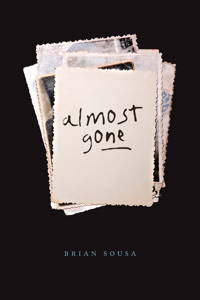 Almost Gone
Almost Gone
by Brian Sousa
Tagus Press at UMass Dartmouth, February 2013
192 pages / $19.95 Buy from Tagus Press or Amazon
Brian Sousa’s debut is a novel-in-stories about the life and tragedies of three generations of a Portuguese-American family living in Rhode Island. Their lives are punctuated with a series of desperate escapes abroad, beginning with Scott on the beaches of Brazil mourning the death of his young daughter, re-enacting her drowning in several senses of the word. He doesn’t know that it was a similar flight of desperation that brought his grandmother and grandfather to America from Lagos, Portugal many years ago.
The characters may occasionally run, but they cannot hide from their literary fate. Each character’s private pain explored in turn; each timely revelation increases the stakes. Helena emigrates from Lagos with her husband Nuno, and finds her life in America barren and cruel in comparison. Nuno cannot muster any grief for his wife’s death, and instead nurses his obsession with Catarina, the beautiful Portuguese woman who lives in the guest cottage behind his house. Nuno’s son Paulo listens to his teenage son Scott having sex, while his own marriage is rapidly deteriorating around him. Ten years later, Scott’s marriage is no better: he loses his child and abandons his wife. The unwitting observer to all of this family drama is Catarina, who can never seem to escape her fate as the object of every man’s desire. She too leaves her husband, fleeing into the streets of Granada.
These are stories of loss, infidelity, alienation…all the persistent demons of modern suburban life. And for that matter, of suburban literature since the dawn of Cheever. But Almost Gone glimmers when Sousa manages to step outside conventional grief, and twist the knife ever so slightly. The best example of this is a deeply awkward scene where Nuno arrives at the cottage to woo Catarina, after his son Paulo has just tried the same and left, rejected. Nuno falls, and pleads with her from the ground:
It’s remarkable how well the Portuguese-American experience assimilates into the suburban-American experience. Three generations—from new immigrants to Rhode Island townies—and every parent feels alienated from their child, every marriage struggles to stay afloat in choppy waters. The standout story is the only one from Helena’s point of view, in which she is obsessed with catching the stray dog ruining the garden in a desperate attempt to regain her husband’s affection. When Helena prays she looks to Deus to try to understand her place in this world. The only difference between Helena, her American daughter in law, and millions of disaffected wives is who they’re praying to and what they’re asking for.
Almost Gone is full of these constructed parallels. No scene is without a direct line back to the theme. Sousa drops each chapter neatly in its place. Even mundane interactions are dripping with significance.
“What’s wrong with you?” [Nuno] asked. “What’d you do?”
Helena told him about the black dog in the garden.
“I’ve never seen him,”” he said, peering out the window.
[…]
Nuno picked up one of the pancakes, stared closely at it, and then threw it back on his plate.
“What happened to these? They look different.”
Helena hadn’t done anything different with the pancakes. She didn’t know what he was talking about. But she made him some more, because she didn’t want to get into anything.
Finally Nuno pushed his plate away and ran a hand over his mouth. “I’ll take Paulo to school on my way to work, since you woke me up so early, banging on the damn window”
“I’m sorry,” she said. “but it was the dog, not me.” (p. 105)
For all of its Portuguese bullion, the flavor of this novel is staunchly American. The novel-in-stories format, the quiet desperation of every character, the touching and awkward sex scenes: it is all very of-the-moment in American literary circles. This extends down to the craft level, with the epistolary section, the bilingual swearing, and all the things the characters imagine saying to each other but never do. A graduate of Emerson’s WLP program, Sousa clearly learned his lessons well—perhaps too well. The result is a quintessential “MFA novel”: technically flawless, emotionally weighty, but lacking in the creative risk-taking that makes fiction a transcendent joy.
***
Claire Blechman is from one frozen hinterland or another. She is an honorable-mention-winning writer, thanks in part to her MFA from Emerson College. Her work has appeared in The Fiction Desk, Gargoyle, Interrobang, the Ploughshares review blog, and the Vault Guide to the Top 100 Law Firms. She wrote her whole website by herself, then unimaginatively named it claireblechman.com.

Tags: Almost Gone, Brian Sousa, Claire Blechman

oof, that excerpted scene between Nuno and Helena is pretty painful. this talk of the “quintessential MFA novel” makes me sad, though. all my impulses want to think that MFA programs and their young participants would produce the most creative risk-takers, but that doesn’t seem to be the case or collective agreement.
Hey Emmab- I disagree, actually. “Quintessential MFA novel” seems to have become a catch-phrase for reviewers, but — and I’ve talked about this with many of my friends and colleagues, many of whom are not MFAs — what does it actually mean? Is the idea that MFA programs promote ‘safe’ writing, and that risk is better learned by lifestyle or experience, or misunderstanding craft? It is a really interesting discussion to have. My take is that if a book has some emotional weight, than that is a good thing.